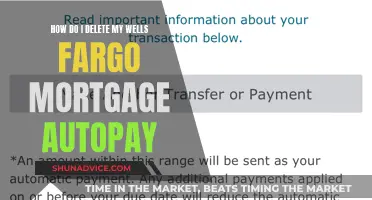
Choosing the right mortgage is a crucial step in the home-buying process. With so many options available, it can be challenging to know where to start. It's important to understand your financial situation and how much you can afford. Lenders will assess your credit score, income, debts, and savings to determine your eligibility. You should also consider the interest rate, loan term, and down payment requirements when selecting a mortgage. Comparing multiple lenders and reading reviews can help you find the best option. Additionally, seeking guidance from professionals, such as loan officers or mortgage brokers, can provide valuable insights and make the process less stressful.
| Characteristics | Values |
|---|---|
| Down payment | Ranges from 0% to 20% or more |
| Credit score | A higher score leads to better rates and approval chances |
| Interest rate | A lower interest rate is preferable |
| Loan term | The most popular term is 30 years, but shorter terms have lower rates |
| Lender | Options include mortgage companies, regional banks, credit unions, small banks, and brokers |
| Customer service | Choose a lender that is responsive, communicative, and transparent |
| Pre-qualification | Some lenders offer pre-qualification with no impact on your credit score |
What You'll Learn

Check your credit score
Checking your credit score is an important step in the process of choosing a mortgage. Your credit score, along with your income and debts, will be used by lenders to determine your eligibility for a mortgage. A higher credit score will generally make you more eligible for a mortgage, and it is important to check your credit score before applying for a mortgage to ensure that you are in a good position to be accepted. By law, you are entitled to a free credit report from each of the three major credit bureaus at least once a year. These bureaus are Experian, Equifax, and TransUnion, and you can request these reports for free through AnnualCreditReport.com. Make sure there are no mistakes in your reports that could negatively impact your score.
If you have a good credit score, lenders will likely be more optimistic about how much house you can afford than you are. It is important to be aware that their job is to sell a loan, and your job is to pay it back. A higher credit score will also make you eligible for a wider range of mortgages. For example, a conventional loan usually requires borrowers to have very good credit, stable employment, and income histories, and the ability to make the lender's required down payment. FHA loans are best for low- to moderate-income borrowers who cannot qualify for a conventional loan product or afford a significant down payment. Borrowers with a FICO score as low as 500 can qualify for an FHA loan with a 10% down payment, and those with scores of 580 or above may qualify with a 3.5% down payment.
If you have a rocky credit history, you may still be eligible for certain mortgages. Government-guaranteed loans tend to have more relaxed credit and down payment requirements. For example, the U.S. Department of Veterans Affairs (VA) guarantees mortgages for qualified military service members, veterans, and their spouses, with no down payment required. Jumbo loans are designed for borrowers who need a loan amount above conforming loan limits, and these may be the only option for those buying or refinancing in an expensive housing market. If you have challenges with your income or credit reports, a broker may be a good choice as they do business with many different mortgage lenders and can help you get preapproval.
Unlocking More Mortgage Money: Strategies for Bigger Borrowing
You may want to see also

Compare mortgage lenders
Comparing mortgage lenders is an important step in the home-buying process. It is recommended that you talk to at least three lenders before making your selection. This can help you determine the pros and cons of each and choose the one that best meets your needs.
Firstly, it is important to understand the different types of mortgage lenders. These include national banks, regional and community banks, credit unions, mortgage companies, and online-only lenders. National banks typically offer a variety of home loans and have both online and in-person services. Regional and community banks vary in the number of branches and products offered. Credit unions are non-profit and member-owned, and they rarely sell their mortgages. Mortgage companies can provide multiple breakdowns of costs in different scenarios, and online-only lenders may offer low-interest rates and low credit score requirements.
When comparing lenders, it is essential to consider the loans offered, special programs available, the estimated interest rate and annual percentage rate (APR), and origination fees. Interest rates and fees can vary between lenders and impact the total cost of your mortgage, so be sure to ask for a detailed breakdown. A higher credit score often leads to a lower interest rate, and a longer loan term can also affect the interest rate. Adjustable-rate mortgages may have lower initial payments, but these can increase over time.
It is a good idea to request quotes from multiple lenders, providing the same information to each, including the amount you want to borrow and your credit score. This will allow you to accurately compare their offers and determine the most favourable one. You can also ask lenders if they will match other written offers. Remember to get loan estimates before your credit is pulled.
Finally, consider your level of comfort and communication with the lender. Are they responsive and easy to understand? Are they willing to explain things to you without rushing or pressuring you? Are they able to provide you with multiple breakdowns of costs in different scenarios? These are important factors in choosing a lender that is right for you.
Carrying a Mortgage for Another: What You Need to Know
You may want to see also

Understand loan types
Understanding the different types of loans available is crucial when choosing a mortgage. Mortgage loans are typically categorised based on the loan size and whether they are part of a government program. Each loan type is designed for different financial situations, and it is important to find one that meets your needs and budget.
The two main components of a mortgage payment are the principal, which is the loan amount, and the interest charged on that principal. The interest is calculated as a percentage of the principal and is paid to the lender for the privilege of borrowing money. The annual percentage rate (APR) is an essential factor in comparing loans, as it represents the total cost of a loan, including the interest rate and other fees.
There are two main types of interest rates: fixed-rate and adjustable-rate mortgages. With a fixed-rate mortgage, the interest rate stays the same for the entire loan term, providing more stability and predictability for budgeting. On the other hand, adjustable-rate mortgages (ARMs) have variable interest rates that fluctuate over the repayment term. ARMs usually start with lower rates than fixed-rate loans but can increase over time.
Another type of mortgage is a conventional loan, which is the most common type. These loans are funded by private lenders and conform to guidelines set by Fannie Mae and Freddie Mac. Conventional loans typically offer competitive interest rates, flexible loan terms, and multiple down payment options. However, they may have different requirements for the borrower's credit score and debt-to-income (DTI) ratio.
Government-backed loans are also available, such as FHA-insured, VA-insured, and USDA-insured mortgages. These loans tend to have more relaxed credit and down payment requirements. For example, FHA loans are popular among first-time homebuyers and those with lower credit scores due to their low down payment requirements. However, borrowers must pay upfront and monthly mortgage insurance premiums (MIPs).
Additionally, there are jumbo loans, which are non-conforming mortgages for borrowers purchasing high-priced homes that exceed conforming loan limits. These loans usually have higher borrowing costs and are more challenging to qualify for, requiring a higher credit score and lower DTI.
Adding Your Adult Son to Your Mortgage: What You Need to Know
You may want to see also

Assess your financial situation
Assessing your financial situation is key when choosing a mortgage. Lenders will assess your financial situation based on your credit score, monthly debt, monthly income, and savings. You should also consider your day-to-day expenses, such as childcare or health insurance, to ensure that buying a house won't make you "house poor".
Before shopping for a mortgage, it is important to strengthen your credit score, set a budget, and understand loan types. You are entitled to a free credit report from each of the three major credit bureaus at least once a year through AnnualCreditReport.com. Make sure there are no mistakes in your reports that could negatively impact your score.
Calculators can help you determine how much house you can afford. It is important to understand the mortgage you can afford before choosing a lender. Higher down payments and extra savings can help strengthen your application. The amount of down payment you will need to make varies depending on the lender and the type of loan. Some lenders may require a 20% down payment to avoid paying private mortgage insurance (PMI), while others will accept as little as 3% (or even 0%) down. FHA loans, for example, are designed for low- to moderate-income borrowers who cannot qualify for a conventional loan or afford a significant down payment.
It is also worth considering the different types of lenders available to you. You could consider a mortgage company, a regional bank, or a credit union or small bank. Credit unions rarely sell their mortgages, whereas banks often sell off loans to other companies. Brokers may be a good choice if you have challenges with your income or credit report and need several lenders to choose from to get pre-approval. Hard money lenders are private companies that offer short-term loans with collateral but tend to have higher interest rates and shorter repayment periods.
Changing Your Name on Chase Mortgage: A Step-by-Step Guide
You may want to see also

Choose a loan term
Choosing a loan term is a crucial step in the mortgage process. The loan term is the length of the mortgage, during which you will pay the lender in monthly instalments based on the loan's amortization schedule. The most popular loan term is 30 years as it offers the lowest stable payment and rate. However, shorter-term loans, such as 15-year fixed-rate mortgages, have lower rates but higher monthly payments due to the faster payoff period.
If you are a first-time homebuyer, it is essential to understand the different loan terms available and how they align with your financial situation. For example, if you have a low credit score, you may want to opt for a longer-term loan to secure a lower monthly payment. On the other hand, if you have a high credit score and stable income, you may be able to manage a shorter-term loan with higher monthly payments, which will save you money in the long run.
It is also worth considering adjustable-rate mortgages (ARMs) if you need temporary savings and plan to refinance or sell the property before the initial low-rate period ends. Additionally, government-guaranteed loans, such as those offered by the U.S. Department of Veterans Affairs (VA), often have more relaxed credit and down payment requirements, which can be beneficial for those with financial issues.
When deciding on a loan term, it is crucial to shop around and compare multiple lenders. This includes big banks, mortgage companies, regional banks, credit unions, and brokers. By considering various options, you are likely to save money and find a loan term that suits your needs. Online tools and calculators can also help you determine how much house you can afford, ensuring you don't stretch yourself too thin financially.
Lastly, don't forget to read lender reviews and choose someone you feel comfortable working with. The loan process can be complex, so finding a lender who is responsive, friendly, and willing to explain things in a way you understand is essential.
Assuming Deceased Husband's Mortgage: Florida's Legal Process
You may want to see also
Frequently asked questions
It is important to compare multiple lenders to find the best mortgage lender for your situation. Lenders primarily focus on your credit score, monthly debt, monthly income, and savings when you apply for a loan. You can use a home affordability calculator to determine how much mortgage you can afford. It is also important to consider the lender's responsiveness, communication skills, and willingness to explain the process in detail.
A down payment is the amount of money you pay upfront when taking out a mortgage. The amount of the down payment can vary depending on the lender and the type of loan. Some lenders may require a 20% down payment, while others may accept as little as 3% or even 0%. Government-guaranteed loans tend to have more relaxed credit and down payment requirements.
Mortgage insurance, such as private mortgage insurance (PMI) or mortgage insurance premiums (MIPs), is typically required if you make a down payment of less than 20%. FHA loans, for example, require borrowers to pay both upfront and monthly MIPs. However, VA loans do not require PMI or MIP.
A fixed-rate mortgage has the same interest rate for the entire term of the loan, resulting in stable monthly payments. The most popular loan term is 30 years, which offers the lowest stable payment and rate. On the other hand, an adjustable-rate mortgage (ARM) has a low initial interest rate that increases after a certain period.
Conforming loans are mortgages that meet the requirements set by the Federal Housing Finance Agency (FHFA). These loans have maximum loan limits that vary by geographic area. For 2024, the baseline conforming loan limit for a one-unit property was set at $766,550, with higher limits in certain parts of the country, such as New York City and San Francisco.







